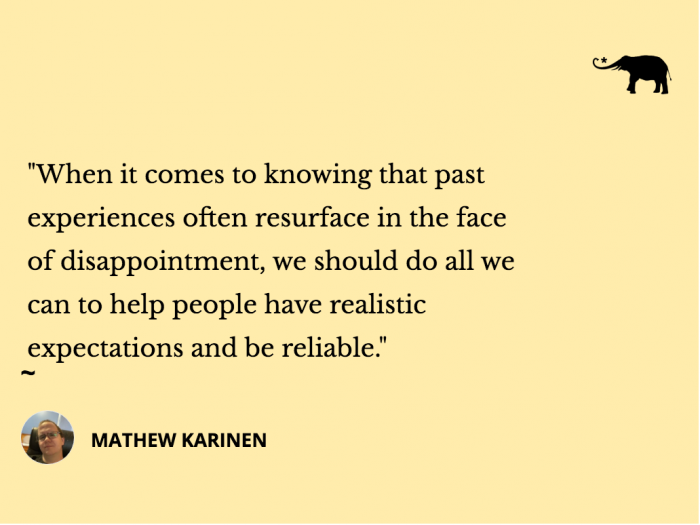View this post on Instagram
We have all faced moments in life where things did not go our way or people did not do the things they said they would do.
Disappointment is a factor in everyone’s life, and no one is immune to it. The fact is that many people have learned to handle it, and others have significant struggles when it happens.
Whether this manifests itself in emotional outbursts of anger or severe catastrophizing—like everything will end because this one thing did not happen—some of us don’t deal well with it.
I know that I used to struggle with this immensely and would catastrophize. I will never forget getting a low C grade back on an Abnormal Psychology test, and I thought I would fail and should just quit the class. It was like that one disappointment was the end of everything. At this time, disappointment still gets the better of me at times, but compared to years ago, the improvement is night and day.
So why do I choose to write about this topic? This is something I see people struggle with and wish that they had the ability to manage and cope with it. I also want people to understand that they aren’t alone in what they are experiencing.
Working in mental health, one thing that can actually make people feel stuck for longer than they should and increases their symptoms is expectations. Often, when expectations are not met, we experience disappointment. Sometimes the disappointment can make a person who already experiences anxiety more anxious or depressed. There have even been times where things like this aggravate a person’s psychosis and can make things (like delusions and hallucinations) become worse.
So, where does this come from, and how can it be helped?
Many times, if people struggle with disappointment in little things, it might have to do with past trauma.
I see this often where a person becomes distraught because someone didn’t do what they said they would do. I can attest that this was part of my struggle in this area for so long. I had a plethora of promises that were made to me for years that never happened.
One I remember was my parents talking about us living in a house instead of a motel room. Well, for the first 21 years of my life, only a few weren’t spent living in a single-room occupancy motel room with my parents and sister. So, when someone would tell me they were going to do something, the lack of follow-through was devastating.
Often, I call this “the past becoming present.”
So, when someone is devastated over something that seems small, I often ask what it might be bringing up and point to the fact that it might have little to do with the situation at hand and more to do with some past trauma or experience that is coming up with the current event.
Also, never be dismissive of what a person is going through. I don’t care if they freak out over a Band-Aid falling off. We never know the experience they might be reliving.
It also could be caused by a simple lack of emotional regulation skills on their part. Many of us don’t realize it because these are not explicitly taught, but we learn a lot of this by simply being in different environments.
I now can see why I struggled with this based on the emotionally unstable environment I once lived. I also can tell because if I’m around a lot of yelling and screaming, it causes me a lot of emotional turmoil. Luckily, I have learned to regulate this, and it does not have the same impact.
People can learn emotional regulation skills at any time, but to many of us, seeing a 40-year-old who didn’t learn the things she needed when she was five can be difficult.
Adults who throw tantrums are not being childish; it is likely they did not learn the skills needed when they were five.
So, the lack of learning these things previously will generally manifest itself in disappointment and a host of other situations.
There could be other reasons why this happens, but I am giving the two most common things I have seen amongst people and myself. So, as they used to say, knowing is half the battle. I would add that the other half is doing. So, what can be done?
When it comes to knowing that past experiences often resurface in the face of disappointment, we should do all we can to help people have realistic expectations and be reliable. There is danger in the word “always” and “never.”
I often tell people I will do my best always to follow through, but I even have times where I can’t do what needs to be done. I live my life in a way that those around me can trust me to come through most of the time, but one thing I do is always communicate when I can’t or why I can’t. Even today, I had to cancel something I told someone I would do, but in the end, taking my cat to the vet had to trump it.
We should do everything we can to help people learn that they can expect people to do what they say, regardless of past experiences. I try and live my life by this rule every day. Life happens, and we should always set up expectations with people that it will happen. We also need to help people to have realistic expectations.
The thing that encouraged me to write this was someone who experiences a deep level of heartbreak every time a specific person doesn’t follow through on something. Well, this has been going on nearly every day for six months. It is time for the expectation to change from they will do what they say to the reality that you can expect them not to.
This is always much easier said than done, but the more we get to the point where we expect the reality, it can become easier to deal with disappointment. I recently learned we could trust everybody if we look at them with a realistic lens.
Can you trust a liar? Absolutely, because you can trust that they will lie.
When it comes to emotional regulation, I will always suggest therapy. Why? Because although we can learn it and gain it, having insights into the things we do by processing them in a safe and therapeutic environment is well worth it.
Seven years of near-weekly therapy has been worth every second and continues to be, even as I work to help others and have studied this stuff myself. The trouble? Not everyone can afford a therapist or even has access to one. I am certain many people come to this website for the help they can get in place of a therapist.
So that becomes my next suggestion. Do the things that you can to learn about what might be happening and gain the skills necessary to regulate your emotions. There are even many books that help with this. A specific therapy would be Dialectical Behavioral Therapy which you can get on Workbooks. This was created by a lady who suffered from this issue herself and found things that helped that have also been validated to work through research.
In the end, we are always going to face disappointment. Some big ones and some small ones. Learning why they may have a larger impact on us than normal can be helpful. Knowing what to do to solve this is the second piece of the puzzle.
As a disclaimer, I also encourage you to learn to sit with difficult emotions, even with disappointment. Often, distress comes, as we don’t want to deal with what we are feeling. Many people really have the ability to feel emotions very deeply, and this is a skill and blessing in my mind.
For me, the blessing is the ability to sit with people in heavy times and not feel a need to do anything. If we learn to regulate our emotions, we can handle them and experience them on a level that gives us the ability to help other people in their darkest moments without feeling our own need to escape.
~












Read 0 comments and reply